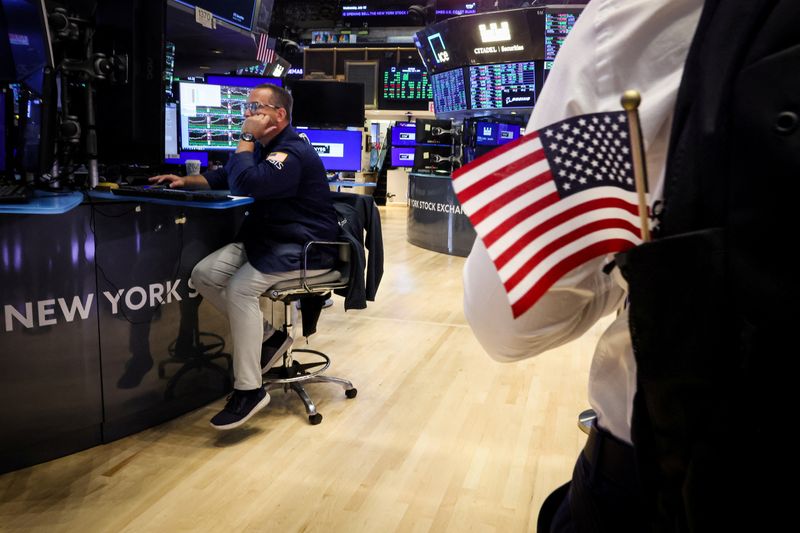By Stephen Culp
NEW YORK (Reuters) -Wall Street stocks rose and the Dow Jones Industrial Average hit an all-time closing high on Tuesday after U.S. retail sales data supported the view that the Federal Reserve is approaching its easing cycle, reining in inflation while avoiding a recession.
All three major U.S. stock indexes advanced on the day, but weaker megacap growth stocks, led by Nvidia Corp (NASDAQ:NVDA) and Microsoft Corp (NASDAQ:MSFT), capped the tech-heavy Nasdaq's gains.
Economically sensitive small caps extended their rally. The Russell 2000 scored a fifth straight day of gains greater than 1%, its longest winning streak since April 2000. The index gained 3.5%, touching its highest level since January 2022.
Dow transportation stocks also outperformed the broader indexes, logging its biggest one-day percentage gain since November and reaching its highest closing level since August 2023 as investors increasingly focused on undervalued areas of the market.
Value stocks, which have underperformed their growth peers and the broader S&P 500 so far this year, jumped 1.5%.
"This rotation underscores the likelihood of interest rate cuts as early as September," said Greg Bassuk, CEO at AXS Investments in New York. "Small cap companies are among the best-positioned to benefit from rate cuts, and today we're seeing this trifecta of strong earnings, a resilient economy and high confidence of a rate cut in September."
Economic data on Tuesday included stronger-than-expected retail sales reported by the Commerce Department. This provided reassurance that consumer spending, which accounts for about 70% of the U.S. economy, has stayed resilient despite restrictive monetary policy, and eased fears that high interest rates could tip the economy into recession.
"As you look at the economic data, it's slowing down but not at a concerning pace," said Tom Hainlin, national investment strategist at U.S. Bank Wealth Management in Minneapolis. "The Fed is seeing what it wants to see - it's that sweet spot of the economy slowing down but not too much and not too fast."
"This small cap rally seems predicated on the Fed cutting rates at the September meeting, where the futures markets are setting up a 100% probability," Hainlin added.
Second-quarter earnings season is ramping up.
UnitedHealth Group (NYSE:UNH) jumped 6.5% after reporting consensus-topping profit, lifting the blue-chip Dow and the S&P 500 Health Care index to all-time highs.
Bank of America's second-quarter profit beat expectations, and underwriting fees rose as capital markets resurged. The second-largest U.S. bank also provided upbeat net interest income guidance, sending its shares up 5.3%.
Morgan Stanley rose 0.9% even after the investment bank posted disappointing wealth management revenue.
Charles Schwab (NYSE:SCHW) slid 10.2% after reporting a dip in interest income.
Tinder parent Match jumped 7.5% on news that activist investor Starboard has a stake of over 6.5% in the company.
The Dow Jones Industrial Average rose 742.76 points, or 1.85%, to 40,954.48, the S&P 500 gained 35.98 points, or 0.64%, at 5,667.2 and the Nasdaq Composite added 36.77 points, or 0.2%, at 18,509.34.
Of the 11 major sectors in the S&P 500, industrials enjoyed the largest percentage gains, while technology and communication services were the only two sectors to end in negative territory.
Advancing issues outnumbered decliners on the NYSE by a 4.58-to-1 ratio; on Nasdaq, a 3.50-to-1 ratio favored advancers.

The S&P 500 posted 94 new 52-week highs and three new lows; the Nasdaq Composite recorded 305 new highs and 29 new lows.
Volume on U.S. exchanges was 11.83 billion shares, compared with the 11.68 billion average for the full session over the last 20 trading days.